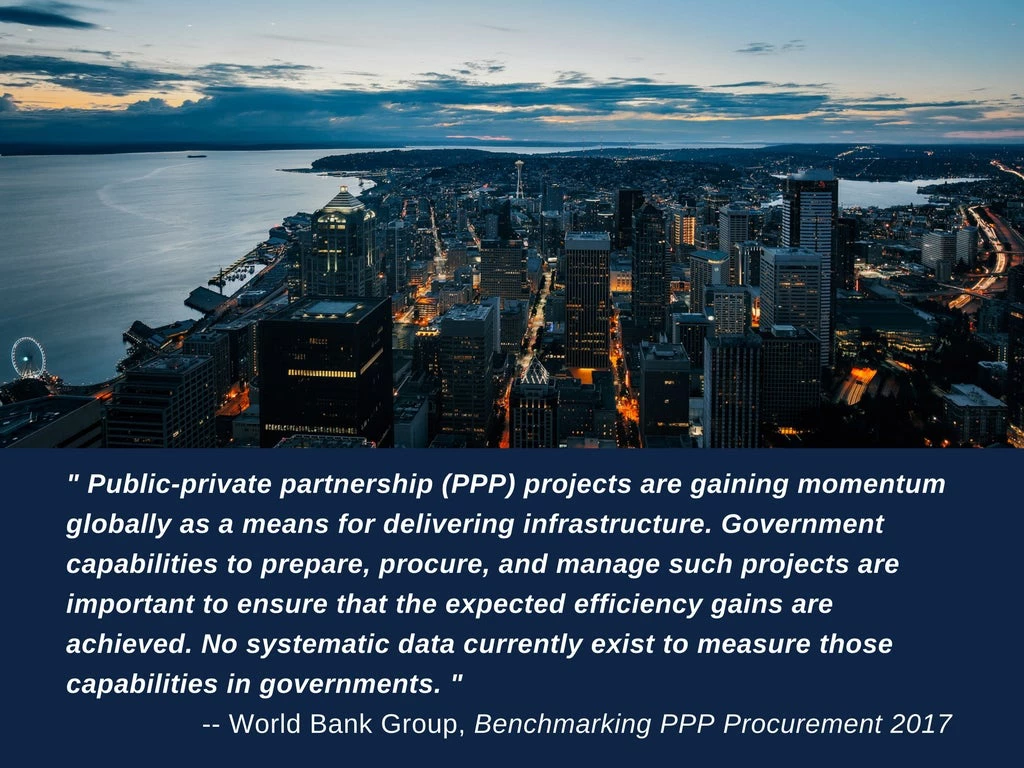Much is written about Public-Private Partnerships (PPPs) from the perspective of the public sector, but one often forgets the private sector forms its own perspectives based on national and domestic market perceptions as well. These perceptions are always based on the availability of reliable qualitative and quantitative information.
Discussions with private sector leads has revealed that information gaps, more often than not, have proven to be obstacles that have resulted in “no-go” decisions on poorly articulated procurements initiated by inexperienced public sector procurement officers. Overcoming private sector hesitation is pertinent to the success of a procurement.
It is always the goal of PPP procurement officers to prepare appealing tender documents that include enough pertinent information that will make it easy for a satisfactory number of prospective private sector partners—who are being courted by the public sector —to be able to confidently decide “yes” on a pursuit. The more qualified responses to a tender, the more likely the public sector will receive innovative and competitive responses. After all, the public sector wants to sell the private sector a product (in effect market it) and this requires an information-rich decision environment.
I was a contributor to the World Bank’s Benchmarking PPP Procurement 2017, which provides useful information on the readiness of 82 governments to implement PPPs (see list of countries included in the report below). The report is particularly important as it provides the private sector with benchmarked information that is the key to effective decision-making when strategically deciding to pursue PPP procurements in information-poor milieus.
Source: Benchmarking PPP Procurement 2017
Internationally, many political leaders are jumping on the PPP bandwagon and pressuring public sector servants to launch PPPs. This is true now in the United States where President Trump has stated on a number of occasions that partnerships between the public and private sectors are a way to mitigate crumbling infrastructure and to build much needed new infrastructure in a world where the public sector needs private sector innovation, institutional capacity, and investment to mitigate the deficiencies of the resource-poor public sector. Success of PPP initiatives requires a wealth of information being provided by the public sector and the creation of enabling environments and legal frameworks that protect the interests and efforts of the private sector as well. Because the private sector is risk averse, prospective responsible private sector partners often have many questions they want conclusively answered before any decisions are made on whether to pursue a PPP procurement.
During the pursuit of large PPP projects, the private sector will, over an often lengthy period of tracking the prospective project, seek answers to a number of questions that will lead its business development team to the decision on whether it is willing to invest the marketing funds necessary for preparing complex PPP project proposals. It the answer is yes, qualified and informed private sector teams will be more successful in launching responses that will result in successful PPP procurements.
Questions will be asked by astute private sector bidders. Satisfactory answers to these questions will help the private sector decide whether sufficient information gaps are addressed, thereby allowing them to make informed decisions. Detailed answers to these questions also serve as bolsters to the private sector’s understanding of project specific enabling environments.
The following questions, in no particular order, should be asked:
Question 1: Is the project included in a pipeline of nationally sanctioned strategic infrastructure projects?If the answer is yes it helps determine whether the project is likely to be supported by stakeholder ministries or agencies (e.g. Finance, and Treasury).
Question 2: Is there broad and bipartisan political support for the project?
Political risk is difficult to manage, especially in democracies where there are regular changes is governments. No one wants to face a scenario where a party pushes an agenda to develop a project that is against the wishes of the opposition that then might immediately cancel a project if it comes to power. Political champions should do everything in their power to obtain broad-based political support.
Question 3: Has the public agency or ministry ever procured a PPP project before?
This is a great concern to the private sector who does not want to face unnecessary risk caused by public sector inexperience. It would help the private sector to know whether the public sector has engaged reputable consultants to navigate them through their initial endeavors during the launch of once-off or pilot projects.
Question 4: Does the public sector understand what PPPs really are and are their expectations about PPPs reasonable?
In many emerging economies, there is often a certain level of naivety on what PPPs can deliver and the effort it takes to implement them. This results in expectations, outcomes, and contract deliverable timelines that can be arbitrary and place the project at risk. It is therefore important that a pool of potential domestic and international qualified PPP private sector experts be consulted extensively when PPP projects are being launched for the first time.
Question 5: Why was it decided to pursue a PPP path?
A very clear rationale for the decision needs to be supported by feasibility studies that include a Value for Money (VfM) analysis, a Public Sector Comparator (PSC) assessment, and a sustainability analysis. If this path has not been followed, there should be serious concerns why this project is even being launched as a PPP.
Question 6: Is the project bankable?
There are many factors that determine whether the project is bankable, which simply put refers to the question whether lenders are willing to finance the project. It would behoove the public sector to provide the necessary information that would make it easier for the private sector to line up investors with confidence before they pursue the procurement. Many a PPP procurement has come to naught after the awarding of a tender because of the inability to commit investors. It is important that clear revenue streams, possible subsidies, availability payments and guarantees, for example, be disclosed to instill confidence in investors and lenders. It must be remembered that no institution will provide “free money” to a project that is considered risky. The greater the risk, the greater the investment and lending costs. Clear and progressive policies on repatriation of profits for international partners and taxation can only improve project bankability.
Question 7: Does the institutional capacity exist to manage a PPP project?
There is often a naive expectation the private sector will take over the project and manage it as a passive partner for the lifetime of the project. This is not the case; the private sector will need counterparts in the public sector who are knowledgeable and competent co-managers of contracts. Therefore, it is critical that if the public sector is intent upon developing an enduring PPP program that it builds its own institutional capacity. If the project is a pilot project or a once-off project, then it should reach back to a national PPP resource (PPP Unit), a multilateral bank (e.g. World Bank Group), or credited consultants to navigate them throughout the lifetime of the project.
Question 8: Is the project size reasonable for a PPP?
Due to the transactional costs incurred by the private sector in pursuing a PPP project, it is important that projects be a reasonable size. Smaller similar projects might be bundled to make the opportunity a more attractive proposition.
Question 9: Is the procurement process truly transparent and competitive?
Countries and agencies that procure PPPs need to commit to supporting transparent and competitive procurements . The private sector is very sensitive to any factors that would compromise their competitiveness. It is critical that the interests of private sector bidders be protected and that no preference is shown to any party. This includes preference for domestic bidders over international bidders, protection of intellectual property, anti-corruption legislation, and rules regarding arbitration, for example.
Question 10: Is there a clear understanding of the different roles of partners and stakeholders?
The terms “partners” and “stakeholders” are often loosely interpreted. As a result, their specific roles can become tangled and lead to misconceptions that result in expectations that are groundless. At all times, it is important that the term “partner” is clearly defined as a legal partner with binding contractual commitments with shareholders in the PPP Special Purpose Vehicle (SPV). Stakeholders (who can include other ministries, citizen groups, etc.) are a wider group of “informal partners” who are interested in the outcomes of the PPP project that potentially impacts them. They have a role as advisors and should be informed at all times, but should be steered away from making decisions that could impact the management decisions and viability of a project. Clear guidelines in this regard will assure the private sector that management risk will be manageable.
There are many more questions the private sector should ask the public sector. However, information rich answers to these 10 questions will help competent private sector companies decide whether they wish to be a partner in a PPP and respond to a specific procurement.
Should you wish to know more about PPPs, please feel free to drop me an email.
This blog originally appeared on David Baxter’s LinkedIn page.




Join the Conversation